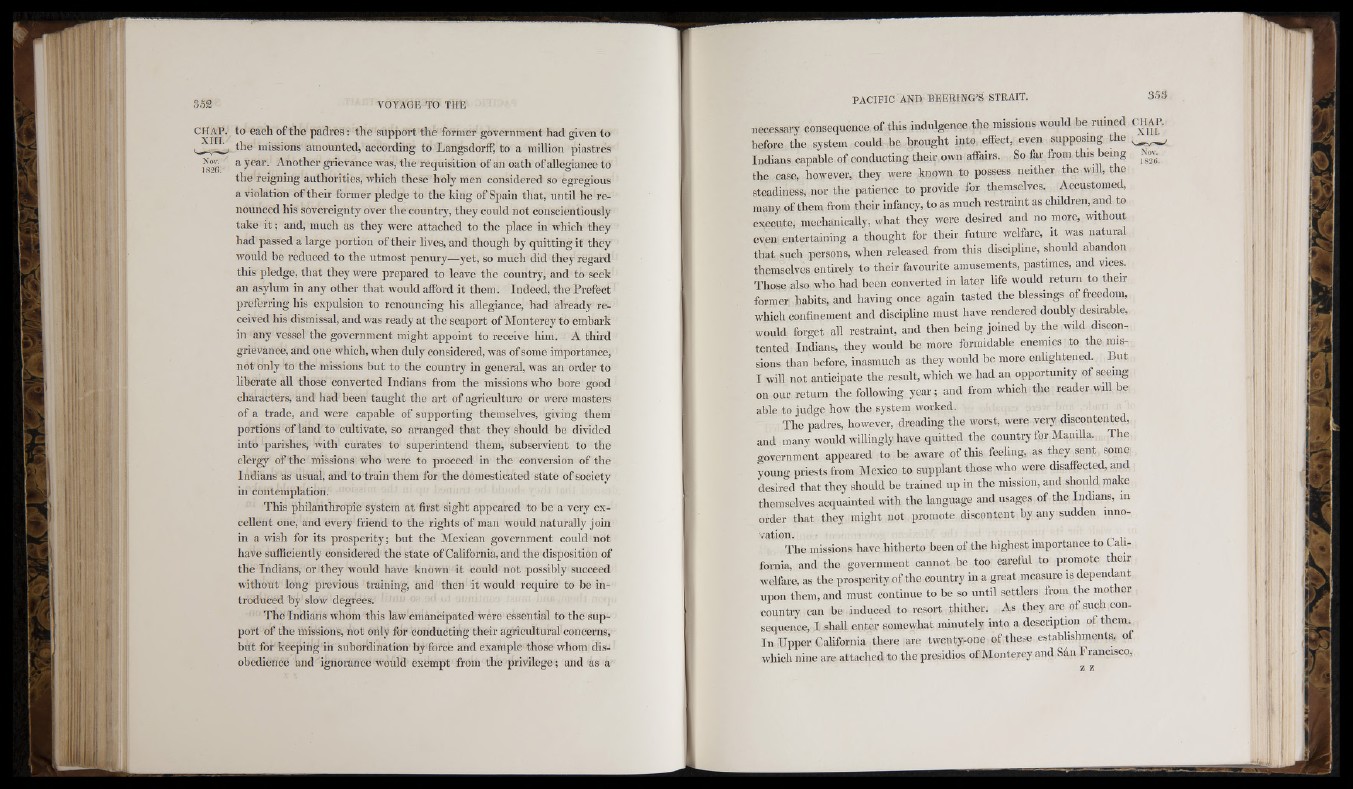
Cito
each of the padres; the support the former government had given to
the missions amounted, according to Langsdorff, to a million piastres
a year. Another grievance was, the requisition of an oath of allegiance to
the reigning authorities, which these holy men considered so egregious
a violation of their former pledge to the king of Spain that, until he renounced
his sovereignty over the country, they could not conscientiously
take i t ; and, much as they were attached to the place in which they
had passed a large portion of their lives, and though by quitting it they
would be reduced to the utmost penury—yet, so much did they regard
this pledge, that they were prepared to leave the country, and to seek
an asylum in any other that would afford it them. Indeed, the Prefect
preferring his expulsion to renouncing his allegiance, had already received
his dismissal, and was ready at the seaport of Monterey to embark
in any vessel the government might appoint to receive him. A third
grievance, and one which, when duly considered, was of some importance,
not only to the missions but to the country in general, was an order to
liberate all those converted Indians from the missions who bore good
characters, and had been taught the art of agriculture or were masters
of a trade, and were capable of supporting themselves, giving them
portions of land to cultivate, so arranged that they should be divided
into parishes, with curates to superintend them, subservient to the
clergy of the missions who were to proceed in the conversion of the
Indians as usual, and to train them for the domesticated state of society
in contemplation.
This philanthropic system at first sight appeared to be a very excellent
one, and every friend to the rights of man would naturally join
in a wish for its prosperity; but the Mexican government could not
have sufficiently considered the state of California, and the disposition of
the Indians, or they would have known it could not possibly succeed
without long previous training, and then it would require to be introduced
by slow degrees.
The Indians whom this law emancipated were essential to the support
of the missions, not only for conducting their agricultural concerns,
but for keeping in subordination by force and example those whom disobedience
and ignorance would exempt from the privilege; and as a
necessary consequence of this indulgence the missions would be ruined CHAP.
before the system could be brought into effect, even supposmg the
Indians capable of conducting their own affairs. So far from this being
Nov.
182ti.
the case, however, they were known to possess neither the will, the
steadiness, nor the patience to provide for themselves. Accustomed,
many of them from their infancy, to as much restraint as children, and to
execute, mechanically, what they were desired and no more, without
even entertaining a thought for their future welfare, it was natural
that such persons, when released from this discipline, should abandon
themselves entirely to their favourite amusements, pastimes, and vices.
Those also who had been converted in later life would return to their
former habits, and having once again tasted the blessings of freedom,
which confinement and discipline must have rendered doubly desirable,
would forget all restraint, and then being joined by the wild discontented
Indians, they would be more formidable enemies to the missions
than before, inasmuch as they would be more enlightened. But
I will not anticipate the result, which we had an opportunity of seeing
on our return the following year ; and from which the reader will be
able to judge how the system worked.
The padres, however, dreading the worst, were very discontented,
and many would willingly have quitted the country for Manilla. The
.government appeared to be aware of this feeling, as they sent some
young priests from Mexico to supplant those who were disaffected, and
desiréd that they should be trained up in the mission, and should make
themselves acquainted with the language and usages of the Indians, in
order that they might not promote discontent by any sudden innovation.
.
The missions have hitherto been of the highest importance to California,
and the government cannot be too careful to promote their
welfare, as the prosperity of the country in a great measure is dependant
upon them, and must continue to be so until settlers from the mother
country can be induced to resort thither. As they are of such consequence,
I shall enter somewhat minutely into a description of them.
In Upper California there are twenty-one of these establishments, of
which nine are attached to the presidios of Monterey and Sâii Francisco,
■7. 7.
: It
! ; I